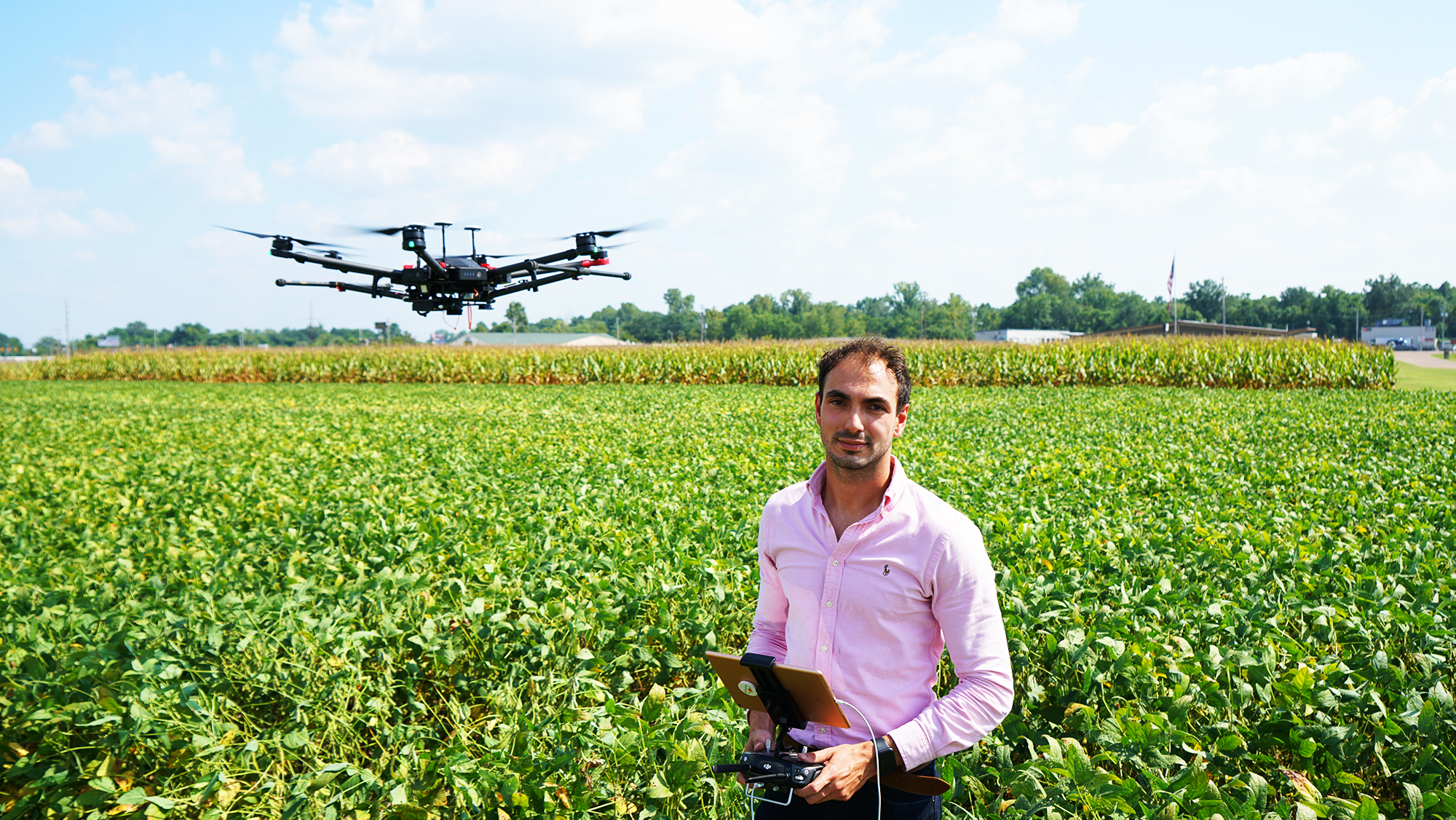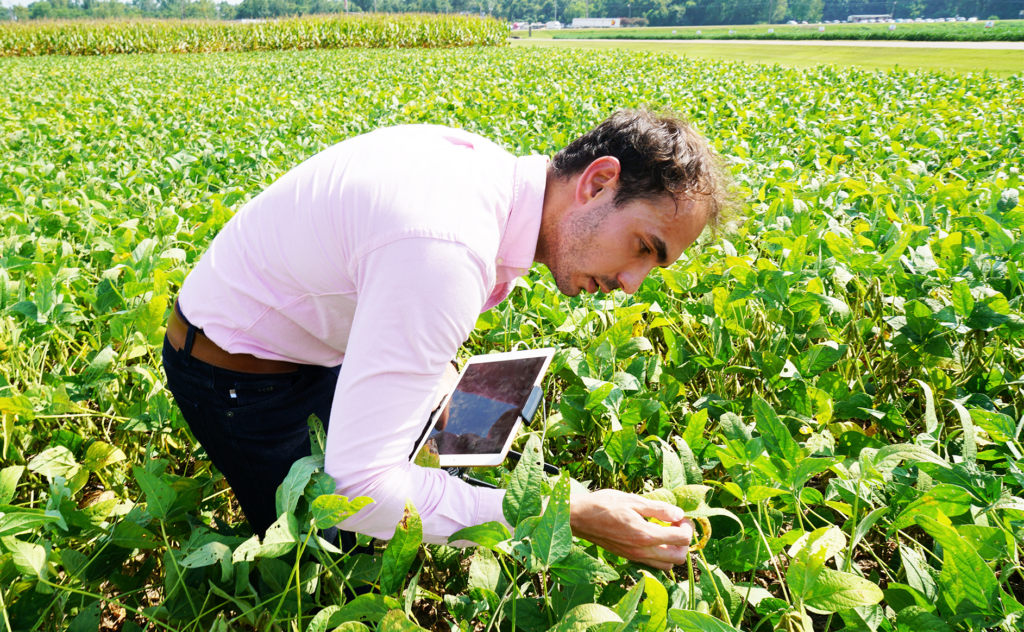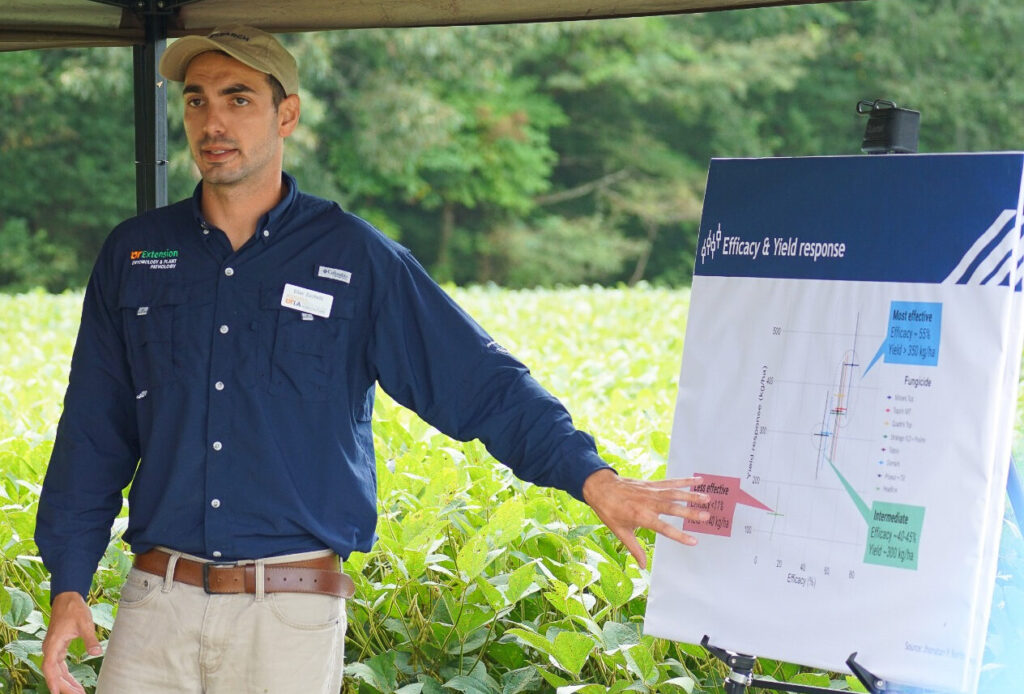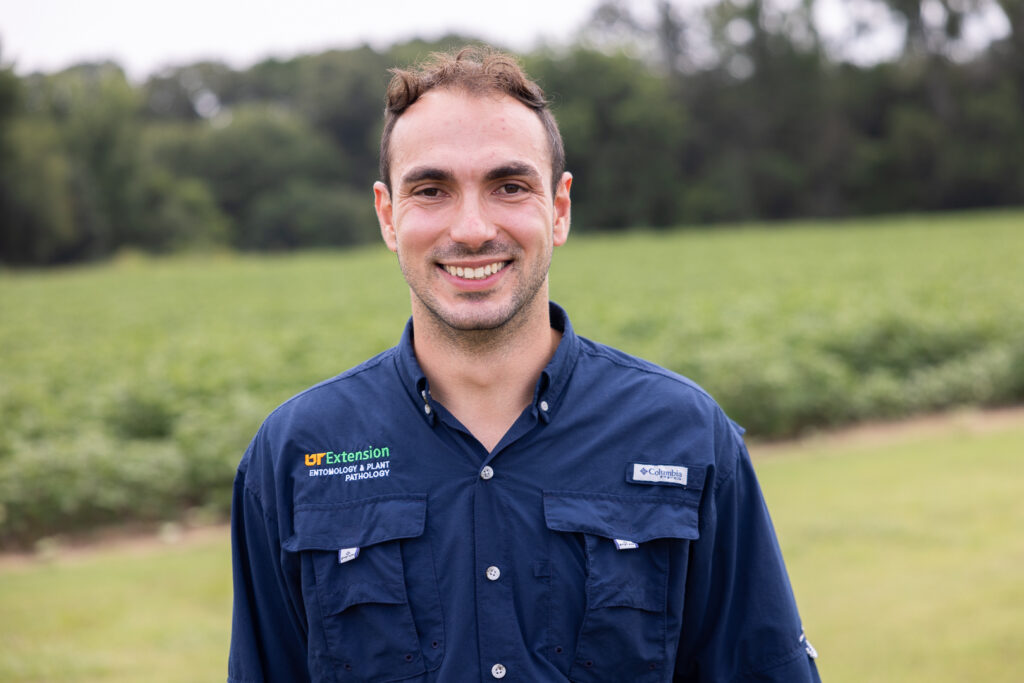
Plant pathology graduate student explores innovative solutions to combat fungicide resistance
Can you share a bit about your background and the journey that brought you to the UT Institute of Agriculture?
I grew up on my family farm in southern Brazil, where I learned about farming, growing crops, handling machinery, and managing the business. During high school, I attended a technical agriculture school, which allowed me to gain more knowledge through specialized classes on the subject.
When I began my undergraduate studies in agronomy, I also started interning in a plant pathology lab. This was around the same time that fungicide resistance to soybean rust started to be seen, and I saw fungicides losing efficacy in the field year by year.
During an internship at the Strawberry Plant Pathology Lab at the Gulf Coast Research and Education Center at the University of Florida, I learned valuable lab skills and contributed to identifying the first cases of fungicide resistance for Phytophthora cactorum and Phytophthora nicotianae. Seeing the impact of fungicide resistance on growers made me explore methods to overcome or prevent such issues in the future. This led me to recognize the potential of using remote sensing and digital agriculture tools to identify and forecast disease and optimize fungicide application.
While studying abroad at Universidad de Concepción in Chile, a fellow student from the University of Florida mentioned a professor who was looking for a PhD student. Although I was still two semesters away from graduating, I needed to complete an internship for my undergraduate degree. This is when I met Dr. Heather Kelly and became a volunteer, ultimately leading me to the UT Institute of Agriculture.
Can you tell us about your research and why it is important?
As I briefly mentioned before, my initial motivation was to find solutions to overcome fungicide resistance, a struggle that I could see in farmers such as my father. However, I’ve always had an innovative mindset, often looking for ways to disrupt conventional methods. So, it wasn’t surprising that I gravitated towards a project with these features.
Dr. Kelly’s lab focuses on providing practical solutions for growers. My current projects involve analyzing historical data sets generated over the years and applying machine learning and artificial intelligence models to them. These models help us understand pathogens’ behavior under different environmental and weather conditions and their response to various control methods.
By comparing current weather occurrences to our models, we can predict the risk of diseases and estimate the efficacy and necessity of control methods. This research is crucial because it allows us to optimize fungicide application, reducing unnecessary use and improving crop health, which ultimately benefits growers by increasing yields and reducing costs.
What role do you think technology will play in the future of plant pathology and agriculture?
It would be naïve to say that technology does not already play a crucial role in agriculture and plant pathology. For instance, GPS technology has enabled the use of georeferenced data to create harvest maps, allowing farmers to understand which parts of their fields are underperforming and need improvement. Advisory systems for fungicide sprays are already implemented in crop systems such as potatoes and strawberries, where the number of sprays throughout the season has been reduced by half. Robots are automating indoor farms for the production of minor crops. Disease diagnosis systems based on spectral images are also under development, and they have already proven the ability to diagnose diseases before they can be identified visually.
Beyond the farm, the industry is using machine learning models to optimize the pipeline for the development of new molecules, identify and study new genetic traits, and estimate the distribution and demand of products.

There is still much more to come. Autonomous vehicles, UAV (drone) spraying systems, and predictive systems leveraging the Internet of Things (IoT) will play significant roles. With the vast amount of data being collected, I foresee the addition of data scientists to farm teams to optimize models according to each farm’s specific environment. Crop varieties being characterized based on their hyperspectral signatures, enabling UAVs to better assess when they are under stress. Augmented reality goggles could bring the scout field activity to inside the office.
What are some of the challenges and rewards of being a PhD student researching plant pathology?
I gained a better understanding of graduate school after watching a documentary about Serena Williams, where she was preparing to return to playing after having a baby. In one scene, her coach was pushing her hard, despite her already being one of the greatest athletes ever. It struck me that it wasn’t about the coach demanding more for his own sake, but about showing her how much further she could push herself. This helped me understand the role of an advisor in graduate school.
The challenges of being a PhD or a master’s student are unique to each individual. These programs are designed to push you to your limits, expanding your knowledge, stretching your comfort zone, and making you smarter and more resilient. The journey is tough and demanding, often requiring you to overcome your own limitations. However, the reward lies in the personal growth and development you experience along the way.
Can you describe a specific project you are currently working on and its potential implications?
Sure, over the last five years I’ve learned about drone flying, orthomosaic maps, data extraction, and sensor capabilities in order to create a platform that farmers can use to map their fields and identify infected area with a disease and, as a result, require appropriate treatment. As a result, over the course of the season, I flew two different fields in West Tennessee. There have been many failures, crashes, and questions about how to manage things, but they are now getting along.
Congratulations on being named a Fellow of the Foundation for Food and Agriculture Research! How has this recognition impacted your work and career aspirations?
Thank you! The FFAR Fellows program is fantastic, and I strongly suggest it to every graduate student. The program has been really beneficial; it has presented me with a clear path to achieving my desired career ambitions. One of the things I value the most is having mentors from fields where I want to work, and this mentorship adds a wealth of expertise into my career development. It might come as a surprise, but the professional development is closely related to personal development. The program has significantly increased my self-confidence and highlighted areas for improvement while also helping me better utilize my strengths, building an environment that allows for my personal growth and career development.
What is one thing you wish people knew about the field of plant pathology?
While it’s not just about plant pathology, I wish the general public better understood the immense effort by researchers, growers, and the industry to produce safer, more secure, and environmentally friendly products. This often makes me an advocate among my friends who don’t have an agricultural background. Many of our conversations involve me explaining how pesticides work, how plasmid transfer enables the transformation of genetically modified plants, and where the pesticides act within the plant. I also emphasize that growers do not want to use more products than necessary because it not only impacts the environment but also increases their production costs. This is what I would like people to know about agriculture.

Can you share any specific experiences or collaborations with the faculty at the West Tennessee AgResearch and Education Center that have been particularly impactful or memorable for you?
One of the most recent partnerships with cotton specialist Dr. Tyson Raper has yielded significant benefits. We’ve been researching various aspects of cotton production, such as how weather affects plant emergence and how row spacing influences disease development, all of which impact crop growth. As someone who initially knew little about cotton, learning from Dr. Raper and collaborating on his research has been incredible.
Also, important to highlight that I also have had the opportunity to work on projects that involved many professors and students from the main campus, as well as collaborations with different companies and universities across the Midwest. Learning from them and sharing our findings has been an amazing experience.
What are your long-term goals after completing your PhD?
This is a tough question. I recently heard a former late-night show host mention that it’s okay to admit you don’t know the answer to such questions. However, I do have a few directions in mind.
One of my long-term goals is to continue in leadership roles. Mentoring and being a senior student in the lab has been one of the most enjoyable aspects of my program.
Additionally, I enjoy learning about agriculture in different parts of the world, exploring various crops production methods, and technologies. Promoting the exchange of knowledge across different regions and cultures is something of my interest me.
I know it’s still not a firm goal, but I recognize that the rapidly changing technological world means that the job I might play in the future may not even exist yet. As a result, maintaining a level of flexibility and being aware of industry trends will allow me to adapt to the market as it changes. These chances could be related to project management, consultancy, entrepreneurship, or even the c-suite. I like the quote: “Just remember 5 years ago you dreamed about the place you are now”.
What do you like to do outside of work and/or what is a fun fact about yourself that your fellow graduate students and professors may not know?
One of the things I enjoy doing outside of work is exercising. Going to the gym helps me stay focused and energized. I am also getting back into playing tennis, which I find both fun and a great way to stay active. Additionally, I love watching Formula One racing. It’s a thrilling sport that I follow closely.

